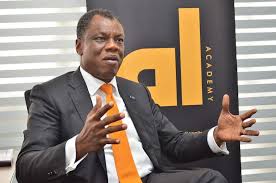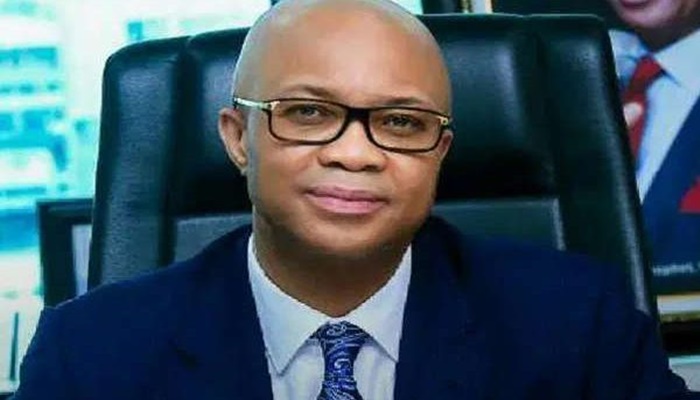

By Sanya Ademiluyi
Central Bank of Nigeria Governor, Godwin Emefiele cuts the figure of a technocrat doing his job with patriotic zeal. Six years into the job , Emefiele has naturally crossed swords a number of times,with the powerful czars of the International Monetary Fund, IMF.Needless to say,a major sticky point would be the naira’s multiple exchange rates. Yet in the past few weeks as covid-19 hit hard, it would appear as if, all of a sudden, Emefiele is bending towards convergence with the IMF especially on the issue of the naira’s exchange rate..
Well, you guessed rightly.Covid-19 has kicked Emefiele.He has seen the country’s oil revenue virtually disappear in recent weeks.
Last week, Emefiele took a step that he has not taken in over three years, moving the naira exchange rate lower to N360/US $ from the N306/US$ at the official window. This is something the IMF had advocated for a long, arguing that the CBN ought to allow a more market driven rate than a tightly managed official market,an argument which Emefiele has politely brushed aside –until now. The naira had exchanged at N360 to the dollar in the open or so-called parallel market for most of 2019,whereas the CBN had kept it at N306 at the official window since 2018.That was a massive, eye-popping N54 margin!
Critics such as Emefiele’s predecessor, Lamido Sanusi have long criticized the current CBN for allowing such a wide margin between the official naira exchange rate and the rate at the open
market specifically because it is an irresistible incentive for ‘round tripping’ of forex from the official market to that on the street corner.
But with the collapse of the international oil prices mid-February in the wake of the spread of the covid-19 out of China round the world, the country had approached the World Bank and IMF for loans to refinance its 2020 budget. Curiously, Emefiele has moved quickly to re-align the naira exchange rate.
But the CBN governor scoffs at observers who have described his move as a devaluation of the naira. Rather, he describes it an “adjustment” of the naira exchange rate. He may be right. Emefiele had merely closed the N54 gap between the two markets, which he had ignored for so long, despite promptings from the IMF and the World Bank!
Nonetheless, Emefiele’ zeal may be shifting from keeping the naira exchange rate at a ”reasonable” level against the US greenback, to helping the Buhari administration to close the massive budget gap, as international oil prices bottomed out- a month ago.
As apparently nervous financial markets reacted in panic mode to the bloodbath in the global oil markets and fearing an upsurge in forex demand by traders ,the CBN promptly shut it second forex window which serves Bureau de Change BDC operators and a few others in March. As ‘official’ supply from the CBN dried up, last month rates at the parallel market began to rise, with the naira fetching fewer and fewer dollars. The US dollar raced from around N388 in early April to N450 by Friday, Aprii 24,2020
By last week, April 25 the naira had slumped to N430 to the dollar, the next day it hit N450 on the open market. But by Thursday, April 30,Emefiele had rallied to cool the market. First the CBN announced a resumption of forex sale to BDCs ,with a hefty $100 million to be put on sale. Then those who wish to purchase forex for school fees abroad and sundry personal expenses could also buy from their banks.
Such supply good news was expected to result in a stronger naira as business resumes at the FX parallel market on Monday, May 4,2020.
Emefiiele needs the IMF to help keep the country afloat financially with the release of a hefty $3.4 billion loan, which the Buhari administration is betting on to close the huge funding gap in the 2020 budget. On Wednesday, April 29 the IMF announced its approval of the loan package which was to be disbursed within the next two days according to country Head of IMF Mission in Nigeria, Amine Mira. The European Union, EU( 20 million Euros) and Germany (22 million Euros)have also chipped in some funds to assist the country in this trying times of the covid19 pandemic. The down side however is that the country no longer has cash buffers at the IMF which may help cushion fresh financial shocks in the near future.
In spite of the government’s big financial headaches, the CBN governor has been quick to announce a N50 billion stimulus loan package to assist Small to Medium Scale Enterprises and individuals whose businesses have been hammered by the covid-19 pandemic. A move that would of course, keep him in the good books of the IMF and World Bank who are concerned about mitigating the adverse effects of the covid19 on the global economy especially those of fragile African economies.










